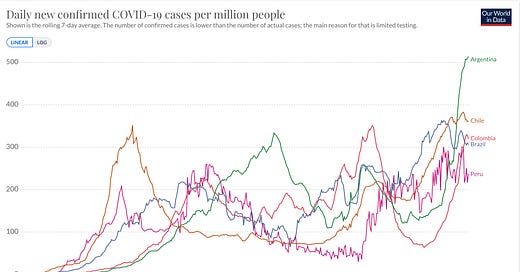Region - The politics of Covid is generating anger and apathy
What occurred in Argentina last week was an exaggerated version of what the region is experiencing right now.
Source: Our World in Data
In nearly every country in South America, cases, hospitalization levels and deaths are at or near their highest or second highest peaks of the entire pandemic. Whether this is wave two, three or four depends on how you want to count them, but it’s a wave. Just over a year after nearly every country shut down during the initial wave, politicians and citizens are fatigued, health systems are overwhelmed, and partial shutdowns of economies continue to harm many of the region’s citizens, even if economic indicators are improving.
What occurred in Argentina last week was an exaggerated version of what the region is experiencing right now.
President Alberto Fernandez announced a new wave of restrictions due to rising cases and limited ICU capacity. In response, people protested with cacerolazos and the media, even those that are generally neutral or favorable to the Peronists, turned somewhat against the president. The mayor of Buenos Aires, Horacio Larreta, took the government to court and won a case that allows schools to remain open in the capital, setting up a showdown between the national and local governments.
Nearly every opinion poll in Argentina has shown a decline in the president’s approval rating including a decline among the president’s base of support. Losing the solid Peronist support he had before would be a major blow going into the midterm elections. None of this is helped by the fact that Argentina’s economy was particularly weak prior to the pandemic.
Governments have legitimate reasons to implement new restrictions to prevent cases from rising higher and collapsing health systems, leading to thousands of additional preventable deaths. Citizens have legitimate reasons to be angry at long term half-measures that seem to benefit certain sectors over others and have failed to stop new waves of the disease.
A few other points about the politics of this wave
Citizen apathy is as dangerous as citizen anger. Protests against government restrictions will get plenty of coverage, but that very visible anger by a small portion of the population masks a growing citizen apathy towards government regulations and political systems. Citizens increasingly believe that governments have failed them and will continue to fail them. That means they will have less trust in public health recommendations. It will also add to the anti-incumbent mood around the region in upcoming elections.
Political leaders are worn down. They've been at this for over a year. Their public approval is down, their agendas are derailed, in many cases their legacies are likely to be tarnished by the numbers of deaths. This isn't why many of them wanted to be elected. Fernandez’s recent comments (including, at one point, blaming citizens and medical workers for rising cases) demonstrated a leader who is making political mistakes after facing a year of tough calls. This is likely to occur in other countries.
Anger at the US rising. In traditional news outlets and on social media, there is a slow growing anger at the US over the view that the country is hoarding vaccine supplies. The actual situation is more complicated than that, but the nuances of the distribution issues aren’t going to generate the same attention. This anger at the US is likely to grow in the coming months, but could be turned around if the Biden administration pivots to greater sharing of vaccine supplies with the hemisphere.
Anger at vaccine diplomacy. Anger is not just directed at the US. Citizens are angry and distrustful of Chinese-made vaccines, which are less effective and have allowed for the continued rise of cases in Chile in spite of the country’s vaccination campaign. Chinese-made vaccines have also been the source of corruption scandals in places like Peru and Argentina. There is concern in multiple countries including Brazil, El Salvador and Paraguay that China is using the vaccines as leverage for issues including 5G technology and Taiwan recognition.
There is anger at Russia over the fact that countries that have ordered vaccines have not received the promised doses. There is anger at India for shutting down exports of vaccines, something that is slowing the whole process. Every country that has engaged in vaccine diplomacy has done the photo ops to try to get the best coverage possible but perhaps seen more setbacks than benefits in the medium term.
Thanks for reading
I’ve got a webinar coming up on 28 April at 2PM EDT. I’m going to focus on Peru and Ecuador, but the politics of Covid regionally will definitely be discussed. Paying subscribers have already gotten the invite link. If you’d like to attend, please subscribe. If you’re a college student, unpaid intern or otherwise can’t afford to subscribe, send me an email and I’ll send you an invitation.



